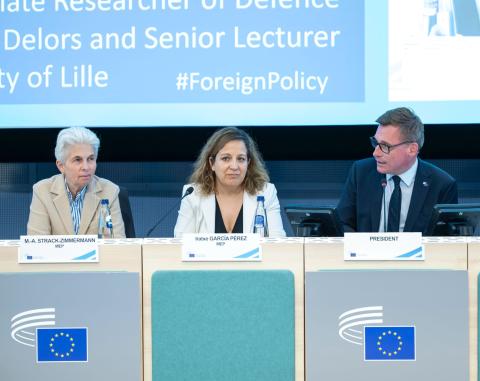European Economic
and Social Committee
The EU can turn geopolitical challenges into new opportunities
Europe must strive to invest in its defence and security while also preserving its social model. Financial trade-offs might be needed due to geopolitical challenges that require us to rethink European priorities. The European Economic and Social Committee (EESC) can facilitate honest social dialogue on the EU’s new needs.
The EESC’s April plenary session addressed EU foreign policy in this new geopolitical climate and complex and growing threats for Europe. Participants reaffirmed that Europe must reassess its strategic priorities and fortify its geopolitical standing in light of an aggressive Russia, new US policies under the Trump administration and China’s strengthened assertiveness. In this context, the EESC is stepping in as a partner grounded in social and democratic dialogue.
EESC President Oliver Röpke stressed: ‘The EESC will continue to ensure that citizen concerns shape concrete policies that protect our social model and reinforce Europe’s role on the global stage. Europe must take greater responsibility for its own security and defence in a rapidly changing world. Strategic autonomy means building stronger capabilities and speaking with one voice’.
The debate incorporated input from the EESC’s ad hoc group on the new geopolitical order, which was represented by Elena Calistru, Winand Quaedvlieg and Sophia Reisecker. They pointed out that Europe’s adversaries are weaponising the Union’s openness and trade inter-dependencies. The paper reflects on the costs of Europe’s strategic autonomy, which is imperative for strengthening the EU’s resilience.
The debate highlighted the fact that these new geopolitical challenges might lead to new opportunities and beneficial cooperation among EU Member States. The Chair of the European Parliament’s Committee on Security and Defence, Marie-Agnes Strack-Zimmermann, stressed the importance of Member States’ collaboration on joint defence procurement and the need to apply a European preference in defence purchases supported by EU funds. This would help to reinforce the EU’s industrial defence base, which will result in new jobs. ‘A Europe
that cannot defend itself will not be secure socially or economically. Without our own ability to act in matters of security, our prosperity and social cohesion are at risk. Those who want to live in freedom must also be able to protect it’, she said.
Iratxe García Pérez, Head of the European Parliament’s Progressive Alliance of Socialists and Democrats, warned against negotiating on EU values and encouraged European citizens to defend truth and the rule of law. She called for more investment in the defence industry, but not at the expense of research and traditional EU policies, such as cohesion policy and the common agricultural policy. ‘We need to invest in defence to defend peace. More EU funding in the new multiannual financial framework (MFF) is needed, as we cannot do more with the same or even less money than in the current MFF’, she said.
In his statement, Fabian Zuleeg, Chief Executive and Chief Economist at the European Policy Centre, advised against ‘falling into progress illusion’, explaining that Europe has not done enough to prevent a future war, including ‘Russian boots in Baltic States’. To this end, Pierre Haroche, Associate Researcher of Defence at the Jacques Delors Institute, supported the view that EU defence financing is not at a sufficient level. He called for new defence coordination in Europe, as ‘we have no NATO to defend Ukraine’.
With political will and social agreement Europe can face geopolitical threats, with an EU economy far greater than that of Russia. As EESC members stressed, Europe can easily afford sufficient investment in its defence, security and resilience, while keeping its European way of life.
Winand Quaedvlieg rapporteur of the EESC ad hoc group on the new geopolitical order, highlighting the overall tone of the debate quoted the Polish Prime Minister Donald Tusk, who during the crucial summit on defence in London in March 2025 said: ‘500 million Europeans are asking 300 million Americans to protect them from 140 million Russians!’
Additional quotes
Stefano Mallia, President of the EESC’s Employers’ Group, stated: ‘The war on Ukraine, the rising power of China and the increasing isolation approach by the US, shifting away from a rules-based approach, are a wake-up call. We need to painfully acknowledge this and realise that the EU must look at greater strategic autonomy without isolating ourselves from our allies’.
Lucie Studničná, President of the EESC’s Workers’ Group, said: ‘When we talk about defence, we overlook the social question. The European social model is also an integral part of a cohesive security and social cohesion – the backbone of a stable democracy’.
Séamus Boland, President of the EESC’s Civil Society Organisations’ Group, said that in order to weather the current geopolitical storm, the EU should continue to keep its values at the centre of its decisions and actions. He drew attention to the role and needs of civil society organisations, stating that ‘the EU needs to maintain climate and social sustainability as its overarching goals and invest in crisis preparedness. Civil society organisations help preserve our democracy. It is imperative that they are effectively involved and helped’.
Work organisation
Downloads
-
The EU can turn geopolitical challenges into new opportunities
